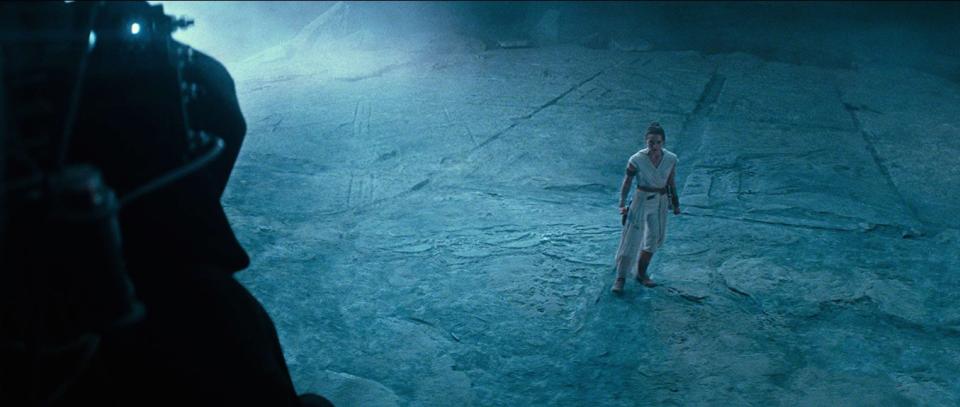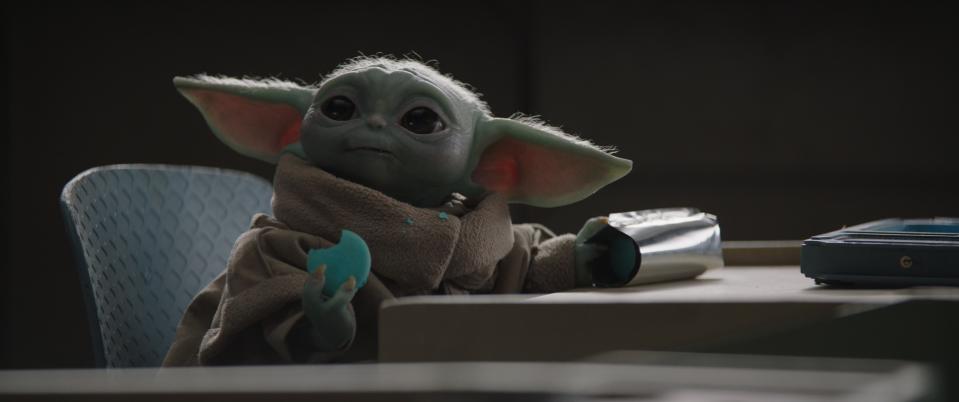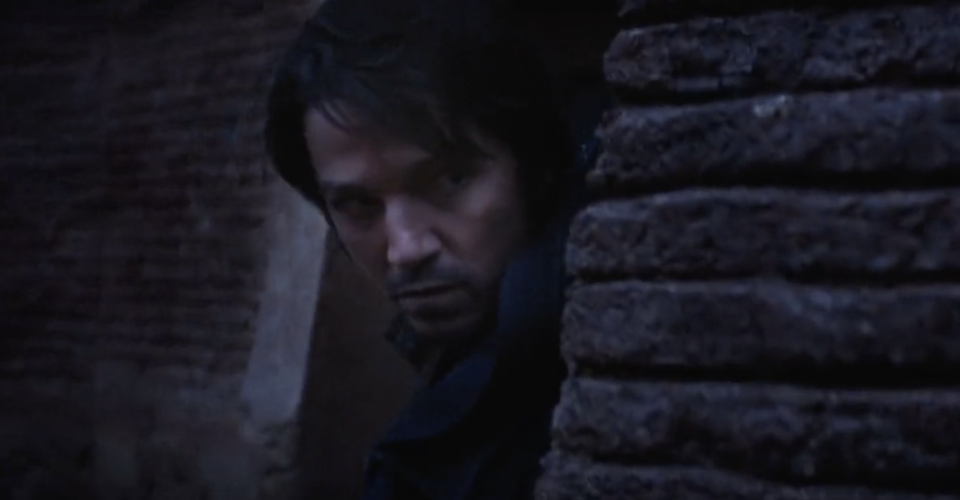The Future of ‘Star Wars’ Movies Doesn’t Feel Very Bright

Disney had a lot to celebrate in April 2019, including the launch of its streaming service Disney+ and the latest iteration of its popular Star Wars Celebration (held in Chicago after recent events in London and Orlando), during which a starry panel prepped audiences for the final film in the second trilogy of Lucasfilm’s tentpole Skywalker Saga. But even with so much to enjoy — and so much of it centered around the jewel that is the “Star Wars” brand — fans didn’t have to look too far to realize that the very medium that had made George Lucas’ invention such a game-changer for Hollywood was in serious danger.
As then-Walt Disney Co. CEO Bob Iger explained, the studio was looking for a little break from “Star Wars” cinema. “We will take a pause, some time, and reset, because the Skywalker Saga comes to an end with this ninth movie,” Iger said at the time. “There will be other ‘Star Wars’ movies, but there will be a bit of a hiatus.”
More from IndieWire
Mark Hamill Remembers Carrie Fisher: 'The Perfect Person in the Perfect Role' as Leia
Bill Hader Says He Stopped Signing Merchandise Over 'F*cked Up' Behavior from 'Autograph People'
Three years later, Iger’s comments have more than proven out. Despite the fact that Disney and Lucasfilm had already announced two new film trilogies before Iger uttered the dreaded h-word — one created by “The Last Jedi” filmmaker Rian Johnson and another one helmed by “Game of Thrones” creators David Benioff and D.B. Weiss — neither have moved forward since their announcement. Johnson’s planned trilogy remains a possibility, though it’s been reportedly “back-burned” as the busy filmmaker works on his “Knives Out” features, while Benioff and Weiss exited their project in October 2019.
And, despite Iger’s bearish take on the future of “Star Wars” films, Disney and Lucasfilm did continue to announce them after April 2019 — including Patty Jenkins’ “Rogue Squadron” and a film directed by MCU director Taika Waititi that he co-wrote with “1917” Oscar nominee Krysty Wilson-Cairns — though like those Johnson and Benioff and Weiss projects, they have not yet come to pass. Neither have rumored projects, like a Kevin Feige-produced feature written by “Doctor Strange in the Multiverse of Madness” screenwriter Michael Waldron or a feature from “Sleight” director J.D. Dillard.

Instead, Disney and Lucasfilm are blazing a new frontier for “Star Wars” storytelling, one that does not rely on the power of the big screen: television. While television has long been part of “Star Wars” lore (including animated series from current “Star Wars” guru Dave Filoni) and the franchise has scads of novels, comic books, and other sorts of outlets for its sprawling canon (plus written works that have since been deemed non-canon), the switch from a film-forward franchise to a TV-based one is new. And, yes, obvious.
In a recent Vanity Fair cover story — amusingly and presciently titled “‘Star Wars’: The Revolution Will Be Televised” — various members of the ever-expanding “Star Wars” television brain trust sound off on what a TV-centric “Star Wars” universe will look like, with scarce details about the film side.
Look no further than this year’s Star Wars Celebration, occurring right now in Anaheim, California after a one-year delay. Recent Celebrations have placed a premium on panels about new “Star Wars” films — they are the big-ticket events, often first out of the gate, the must-attends. Anaheim did indeed open on Thursday morning with a screen-centric panel billed as Lucasfilm’s Studio Showcase. But films were in short supply.
The panel was decidedly TV-focused, with nearly every segment dedicated to the next crop of “Star Wars” adventures, from “Obi-Wan Kenobi” to “Andor” and the upcoming “Skeleton Crew,” all of them television series exclusive to Disney+. The one film that got even a fraction of time? The Harrison Ford-starring “Indiana Jones 5,” itself a Lucasfilm property featuring the “Star Wars” star in his other big Disney role. Though, surprisingly, the Studio Showcase did not offer up the first trailer for the movie.

Disney/screenshot
As Disney+ continues to bulk up on Star Wars series and Iger’s “pause” keeps getting extended, the first Star Wars Celebration since the pandemic reflects the new truth: “Star Wars” is no longer a cinematic property, has not been for a long time, and perhaps never will be again.
Iger’s “hiatus” chatter came on the heels of the film franchise’s lowest-earning release ever: “Solo: A Star Wars Story.” Released in May 2018, the film made less than $214 million at the domestic box office, a far cry from the new trilogy (which all made over $500 million) and even the series’ other offshoot film, “Rogue One: A Star Wars Story” ($532 million). It seemed the relative bomb that was “Solo” — which also notably recast fan favorite stars with younger actors, something the franchise will reportedly avoid from now — spooked Lucasfilm brass more than anything.
Suddenly, it seemed, just slapping “Star Wars” on a film didn’t seem guaranteed to make it a hit, and carving out new modes of storytelling appeared to be much more appealing. But while industry-wide anxiety has led to endless conversations about how streaming is replacing the traditional movie-going experience, how episodic adventures are more successful than one-off features, other blockbuster franchises have been able to weave together both films and TV series in a way “Star Wars” has yet to.
Marvel has, after a few rocky attempts at making both TV series and massively successful theatrical films work for them, cracked a code. The assorted series that emerged out of Marvel films, from dearly departed Netflix series like “Daredevil” and “Jessica Jones” to less successful offerings such as ABC’s “Inhumans” and Freeform’s “Cloak and Dagger,” have been winnowed down to Marvel’s own Disney+ series, all of which tie neatly into the MCU films.
Yes, the blockbuster world is very different than it was even five years ago, but franchise film success should still be possible for legacy brands like “Star Wars.” In 2021, four of the top-earning films were all Marvel properties, even with a robust TV lineup.

Disney/Lucasfilm
So is the “Star Wars” film really dead? As of now, Disney and Lucasfilm have announced two release dates for untitled “Star Wars” films: December 19, 2025, and December 17, 2027. What those films will actually be remains a question, and while SWC would have been the perfect time to announce a new feature — built-in, COVID-created “hiatus” and all — that wasn’t what happened.
In that recent Vanity Fair cover story and a followup Q&A, Kennedy vowed that Lucasfilm does indeed “have a road map” for the franchise’s film future. It will require massive patience, and plenty of flexibility. Kennedy said that, despite being announced after Jenkins’ “Rogue Squadron” feature, she expects Waititi and Wilson-Cairns’ secretive film to arrive first. (Jenkins’ film has been “pushed off to the side for the moment,” and Jenkins is “developing the script further.”)
She demurred on the Feige and Waldron project (“right now, no, there isn’t anything specifically”), and reiterated that while Johnson remains “very committed” to what Lucasfilm is doing, he “literally hasn’t had the time to devote” to his trilogy.
Still, Kennedy indicated that the “Star Wars” team has been pursuing other features and has “been in conversation with over quite a long period of time” with a couple of other filmmakers who could move into the “Star Wars” film space. So, anything to announce now? Again, Kennedy demurred, telling Vanity Fair, “We’ll probably get a little bit more specific in a couple of months.”

Everett Collection
Those next couple of months, however, will be stacked with new “Star Wars” television series. Disney and Lucasfilm have turned to those shows — all, of course, released on Disney+, which now boasts over 130 million subscribers — to fill in its expanding galaxy. But while the movie arm of the franchise might be weak, its impact is unmistakable. After all, none of this exists without the films.
Disney and Lucasfilm’s next much-hyped series, “Obi-Wan Kenobi,” returns prequels standout Ewan McGregor to the fold for a show pretty much demanded by fans over the years. McGregor was originally on deck to star in, yes, a feature film about the beloved Jedi, directed by Stephen Daldry. That pivoted to a series, six episodes all helmed by Deborah Chow. (And, yes, his foil Hayden Christensen is also back for the show; this may all be coming to fans in a new format, but the spine is decades old.)
Also on deck: the Diego Luna-starring “Andor,” itself a prequel to the standalone film “Rogue One.” That series, due out later this summer, will also focus on long-time favorite Mon Mothma (Genevieve O’Reilly, who also played the rebel hero as a young senator in “Revenge of the Sith” before reprising her role in “Rogue One”; Caroline Blakiston played her in “Return of the Jedi”).

Lucasfilm
But the new “Star Wars” TV series are not entirely beholden to the 11 live-action feature films that came before them. Vanity Fair also shared details about a pair of new series that are attempting to mine material beyond the films, including Lesyle Headland’s “The Acolyte” (which takes place about 100 years before “The Phantom Menace,” and is billed “as a mystery thriller set in a prosperous and seemingly peaceful era, when the galaxy is still sleek and glistening” — the tail-end of an era called The High Republic) and Jon Watts’ “Skeleton Crew,” a coming-of-age series set during “post–’Return of the Jedi’ reconstruction [and] that follows the fall of the Empire.”
Those series are built inside the framework of the sprawling “Star Wars” lore, but appear engineered to offer genuinely new stories and perspectives. That’s a lesson the film side of the series could stand to learn, sooner rather than later.
Best of IndieWire
Where to Watch This Week's New Movies, from 'Guardians of the Galaxy Vol. 3' to 'Chile '76'
Every Palme d'Or Winner from the Cannes Film Festival, Ranked
Sign up for Indiewire's Newsletter. For the latest news, follow us on Facebook, Twitter, and Instagram.

